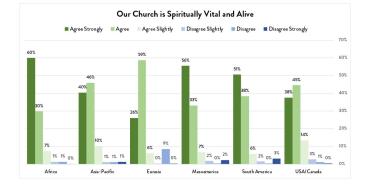Q&A: Making Christlike Disciples

Q. I know that we sense this call to "Make Christlike disciples of the nations," but I'm not sure we are doing a very good job of articulating exactly what that means. What does it mean?
A. Embedded in our Wesleyan-Holiness tradition is the firm belief that God expects the Church to participate in the full transformation of believers. We are not only to lead people to faith in Christ, but we are to walk with one another, be examples to one another, teach one another, and mentor one another toward genuine Christlikeness of character.
Our doctrine of entire sanctification assumes that the Christian journey does not end in our being justified, but continues in a lifetime of increasing formation into likeness to Christ.
When Paul, writing to the church in Ephesus, encourages them to "be imitators of God" (Ephesians 5:1), he is expressing more than mere encouragement. He is challenging them to be formed into the very image of Christ, as is clear in the continuation of the passage.
Therefore, the Church is to teach, model, mentor, and encourage our people to become "Christlike disciples."
This is an intentional effort of the healthy church. It must be planned into our schedules. Small groups, Sunday School classes, and other venues are necessary in order for this to occur. It must not be left to chance. It is our work!
Training must be offered for disciplers. We need material that is consistent with our theological understanding. And, we must live patiently, intentionally, and consistently alongside one another.
This is not a task for the few. The deeper life is not just for pastors or teachers. This is the objective for every believer. The doctrine of entire sanctification is not merely theoretical, nor is the sanctified life one of release and retirement. We are so deeply committed to the disciplines of spiritual formation because we are so convinced that God's grace provides more for us than "just being saved."
We are not redeemed for our own sakes, but for the sake of the mission of God, and for the sake of those around us. And so our task is two-fold:
1) To compassionately and lovingly reach the lost and broken in order to bring them to Christ, and
2) To lovingly and intentionally engage in leading believers into Christlikeness of character and lifestyle.
Jesse C. Middendorf is a general superintendent in the Church of the Nazarene.
Holiness Today, September/October 2010
Please note: This article was originally published in 2010. All facts, figures, and titles were accurate to the best of our knowledge at that time but may have since changed.




